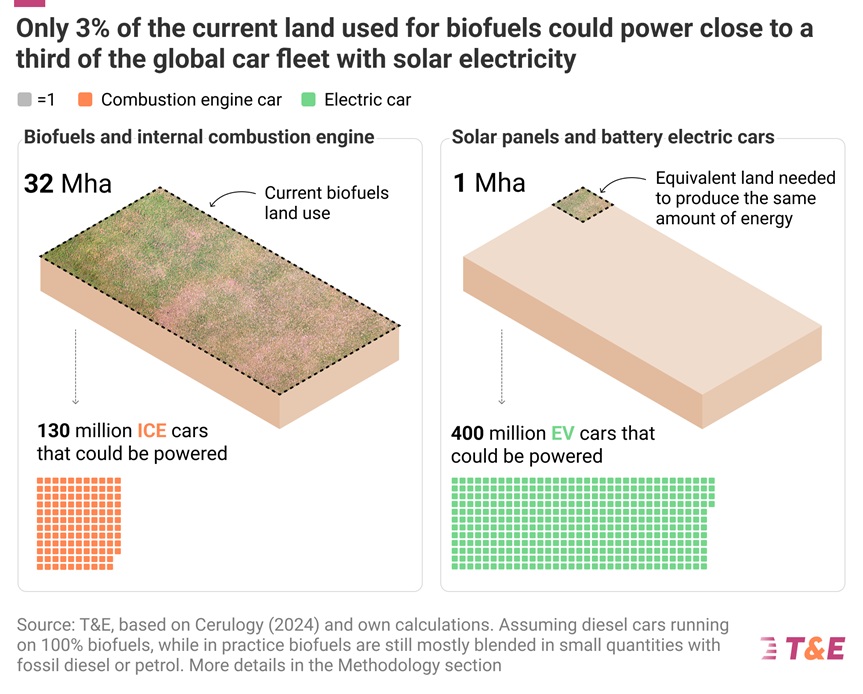T&E Report: Biofuels Globally Emit More CO2 Than the Fossil Fuels They Replace
Released on: Wednesday, 12 Nov 2025 2:35PM

Image: T&E
BRUSSELS, Nov 12 (Bernama-BUSINESS WIRE) -- Global biofuels production emits 16% on average more CO2 than the fossil fuels it replaces, a new Cerulogy report on behalf of T&E shows. With demand set to rise by at least 40% by 2030, T&E calls for global leaders meeting in Brazil for COP30 to agree to limit the expansion of a climate solution that is doing more harm than good.
This press release features multimedia. View the full release here:
https://www.businesswire.com/news/home/20251111500799/en/
These higher emissions are largely driven by the indirect impacts of farming and deforestation linked to crop-based biofuels. By 2030, biofuels are projected to emit 70 MtCO₂e more than the fossil fuels they replace, equivalent to the annual emissions of almost 30 million diesel cars.
The same land could feed 1.3 billion people, while using just 3% of that land for solar panels would produce the same amount of energy. As electric vehicles are much more efficient than fossil fuel cars, that 3% of solar energy would be enough to power close to a third of the world’s current car fleet.
Cian Delaney, biofuels campaigner at T&E: “Biofuels are a terrible climate solution and a staggering waste of land, food, and millions in subsidies. Ensuring a sustainable balance between agriculture and nature is essential to tackling the climate crisis, and burning crops for fuel only pushes us further in the wrong direction. Governments around the world must prioritise renewables over crop biofuels.”
The analysis shows that 90% of global biofuel production still relies on food crops. In 2023, the biofuel industry consumed around 150 million tonnes of corn and 120 million tonnes of sugarcane and sugar beet. In total, the equivalent of 100 million bottles of vegetable oil are burned in cars every day, meaning a fifth of all vegetable oil supply is never even used for food. The energy in all these feedstocks could meet the minimum calorific requirements of up to 1.3 billion people.
T&E’s analysis shows that biofuel crops require significant amounts of freshwater. Driving a car 100 km on first generation biofuels would require on average close to 3,000 litres of water, while only twenty litres would be needed to run an electric car on solar electricity. As climate change puts increasing pressure on water supplies, this could be a disaster, warns T&E.
Brazil is one of the fastest growing biofuels producers and is catching up with the US - the world’s biggest biofuels producer. The country recently decided to suspend its soy moratorium, which protects deforestation in the Amazon from soy cultivation. Canada and India are also among those set to massively increase their production. T&E’s analysis is based on existing government policies and strategies; however, demand for biofuels could also see a massive spike for use in shipping and aviation as part of their efforts to find alternatives to fossil fuels.
Matthias Ong, Singapore Director at T&E: "Singapore and Southeast Asia are set to play a pivotal role in shaping the decarbonisation trajectory of the maritime sector. While there are growing calls to scale up biofuels, it is critical that this transition is guided by robust, evidence-based safeguards. Without effective regulation, expanding biofuels, and in particular first-generation biofuels, could aggravate negative consequences in terms of land use change, water use and competition with food sources. Responsible management and transparent oversight are essential across the biofuel value chains and their regulatory frameworks to ensure we do not end up doing more harm than good."
T&E calls on governments to better safeguard against biofuels that contribute to land clearance and deforestation when making climate policies. Public funds should prioritise smart electrification, efficiency and truly sustainable alternatives, not false solutions, says the group.
View source version on businesswire.com:
https://www.businesswire.com/news/home/20251111500799/en/
Contact
T&E
press.apac@transportenvironment.org
Source: T&E
--BERNAMA